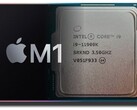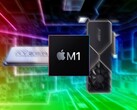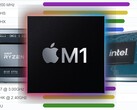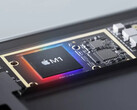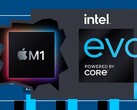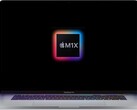The Apple M1, also known as Apple Silicon, that debuted in the Apple MacBook Air 2020 and the Apple MacBook Pro 13 2020 showed that it is possible to offer class-leading performance that can rival traditional x86 offerings from Intel and AMD in a fanless, low TDP profile. We recently took the AMD Ryzen 9 5980HS-powered Asus ROG Flow X13 convertible for a spin and came out pretty impressed. With the M1 showing impressive performance across several CPU benchmarks, we thought it would be interesting to see how close Apple Silicon fares in comparison with AMD’s latest and greatest.
Cinebench R23 is natively available for Apple Silicon so right off the bat, we see Apple M1 and the Ryzen 9 5980HS being on par with each other in single-core. The fact that the M1 is able to beat the Ryzen 7 5800H by 8% and the Core i9-10980HK by 17% within a 10 W TDP envelope is highly impressive to put it mildly. Almost tying with both M1 and the Ryzen 9 5980HS is the Tiger Lake Core i7-1185G7. Multi-core has traditionally been AMD’s forte, and it is not surprising to see the Ryzen 9 5980HS score a healthy 64% lead over the M1 here. On the other hand, M1 is able to outclass the Core i7-1185G7 by 20% despite featuring only four high performance cores.
Cinebench R20, on the other hand, is emulated via Rosetta 2 on the Apple M1, so it is not surprising to see it rank at the end of the comparison.
The fortunes reverse once again in Geekbench 5.3, which is available as a native app for the M1. Here, the Ryzen 9 5980HS trails Apple Silicon by 11% though the multi-core advantage with AMD is only about 13% in this test. M1 is still able to offer 17% and 37% leads over the Core i7-1185G7 in single and multi-core Geekebench tests, respectively.
Overall, the Apple M1 SoC continues to impress against the latest offerings from both Intel and AMD. Though Apple has still a long way to go when it comes to raw multi-core prowess, newer versions of Apple Silicon, especially in the upcoming iMacs, have the potential to significantly narrow this gap.
With Microsoft also rumored to be developing its own ARM-based processor for servers and the Surface lineup and AMD also touted to be working on an M1-like prototype, it may not be long before a good majority of mobile computing goes the ARM way.
Source(s)
Own





